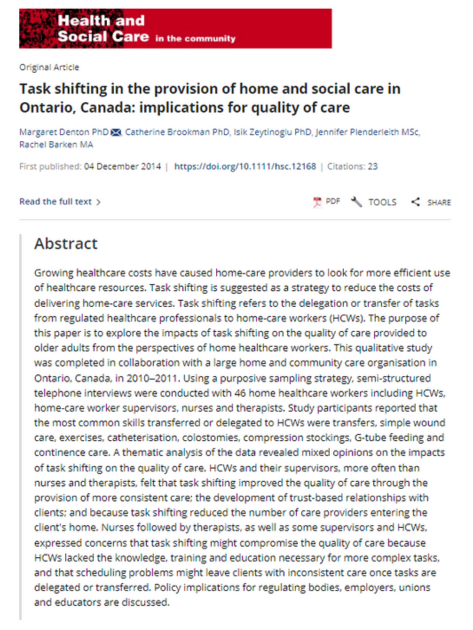Task shifting in the provision of home and social care in Ontario, Canada: implications for quality of care
The purpose of this paper was to gain an understanding of the impacts of task shifting on the quality of care provided to clients from the perspectives of home healthcare workers.
Author: Margaret Denton PhD, Catherine Brookman PhD, Isik Zeytinoglu PhD, Jennifer Plenderleith MSc, Rachel Barken MA
Publication Date: December 4, 2014
Description: Growing healthcare costs have caused home-care providers to look for more efficient use of healthcare resources. Task shifting is suggested as a strategy to reduce the costs of delivering home-care services. Task shifting refers to the delegation or transfer of tasks from regulated healthcare professionals to home-care workers (HCWs). The purpose of this paper is to explore the impacts of task shifting on the quality of care provided to older adults from the perspectives of home healthcare workers. This qualitative study was completed in collaboration with a large home and community care organisation in Ontario, Canada, in 2010–2011. Using a purposive sampling strategy, semi-structured telephone interviews were conducted with 46 home healthcare workers including HCWs, home-care worker supervisors, nurses and therapists. Study participants reported that the most common skills transferred or delegated to HCWs were transfers, simple wound care, exercises, catheterisation, colostomies, compression stockings, G-tube feeding and continence care. A thematic analysis of the data revealed mixed opinions on the impacts of task shifting on the quality of care. HCWs and their supervisors, more often than nurses and therapists, felt that task shifting improved the quality of care through the provision of more consistent care; the development of trust-based relationships with clients; and because task shifting reduced the number of care providers entering the client's home. Nurses followed by therapists, as well as some supervisors and HCWs, expressed concerns that task shifting might compromise the quality of care because HCWs lacked the knowledge, training and education necessary for more complex tasks, and that scheduling problems might leave clients with inconsistent care once tasks are delegated or transferred. Policy implications for regulating bodies, employers, unions and educators are discussed.
Access: To read this article in full you will need to make a payment or have access to a university database
Keywords: home care, home-care workers, home-care workforce, quality of care, skill mix, task shifting



